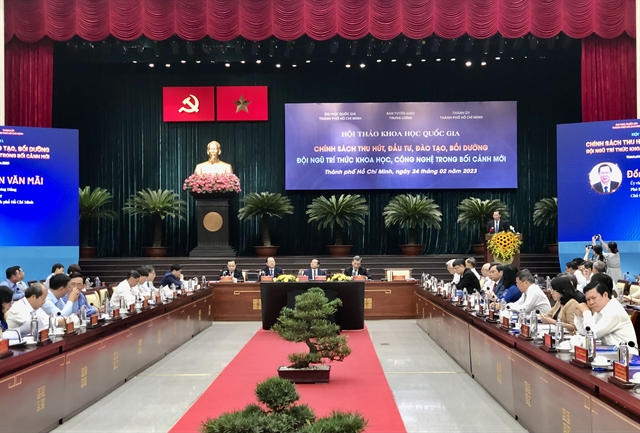 Society
Society


|
| The national scientific conference, seeking better policies to attract more scientific and technological experts at home and abroad, was held in HCM City on February 24 —VNS Photo Nguyễn Diệp |
HCM CITY — Developing more policies is needed to attract and retain scientific and technological experts at home and abroad to contribute to the country's socio-economic development, the standing deputy head of the Party Central Committee's Commission for Propaganda and Education Lại Xuân Môn said at a national scientific conference held in HCM City last Friday.
The conference reviewed results after 15 years of the implementation of Resolution No. 27-NQ/TW on tasks for the development of scientific and technological experts in the country's context of industrialisation and modernisation.
It also discussed issues related to developing better policies to suit the new context that could create the best conditions to boost the important role of experts.
“There are many changes in the national development goals and the socio-economic situation in the country and the global economy that put new development requirements for experts in the new period,” Môn said.
He asked delegates, including managers, leading scientists and experts, to discuss and clarify the causes of limitations and inadequacies in the implementation of Resolution No. 27, then propose tasks and solutions for the new period.
New policies and incentives must include developing highly qualified experts and intellectuals to meet the country's development requirements, promote their innovation, and create a new driving force for rapid and sustainable socio-economic development in the future.
Chairman of HCM City People's Committee Phan Văn Mãi said the city leaders are clearly aware of the important role of experts in the city’s development.
He expressed his appreciation for the active contribution of experts who have helped the city maintain its leading role and develop day by day.
The city holds favourable conditions such as connectivity, a system of institutions, economic and financial conditions, and a market where research can be immediately applied.
“However, it has not yet fully exploited its intellectual property potential for its socio-economic development in the fourth industrial revolution,” he said.
The main barrier is the policy and mechanisms to gather, connect and promote the role of experts, he added.
In the past, the city has issued many policies to attract experts to work at public agencies, but these policies only focused on wages, accommodation and travel conditions.
The city has only attracted about 20 experts.
“This showed that the current policies have not been able to approach and motivate experts and intellectuals,” he said.
Vũ Hải Quân, director of the Việt Nam National University-HCM City (VNU-HCM), said experts have been making important contributions to the country’s socio-economic development, ensuring national security and defence over the past 15 years.
“However, in the field of science and technology, the number of researchers per ten thousand people is still low compared to other countries in the region,” he said.
According to statistics from the Ministry of Science and Technology, the number of research personnel per 10,000 residents in the country is 15.6.
In particular, the number of researchers with doctoral degrees is very low, with a total of nearly 30,000 people.
In addition, science and technology training has not been closely linked to the socio-economic development strategy.
The number of admissions is uneven across industry groups, with a downward trend, especially among postgraduates.
According to the Ministry of Education and Training, the number of PhD students in scientific and technological majors has continuously decreased in the last three years.
There were 1,379 PhD students in 2019 but there were 1,010 PhD students in 2021.
The number of students enrolled in information technology majors has continuously increased to 56,260 students in 2022 from 46,173 students in 2019.
Meanwhile, student enrollment in the natural sciences and life sciences is about 50 per cent of the admission quota.
There was no student enrollment into several majors such as oceanography and geology. The total enrollment of these major groups is less than 30 per cent of the total number of students.
The ratio of state budget spending on higher education is very low, reaching only 0.25 - 0.27 per cent of GDP, while this rate in other countries in the region is 0.6 per cent.
Võ Văn Tới, assistant rector for Health Sciences Development and lecturer at the School of Biomedical Engineering of International University under the VNU-HCM, said it is necessary to have better policies and appropriate solutions to attract overseas talent, and prevent talent from leaving to go overseas for better career opportunities and remuneration.
He proposed to pilot simple-structured flexible mechanisms and build a technical centre for microbiology.
In 2015, the International University’s engineering degree in Biomedical Engineering programme was evaluated by ASEAN University Network – Quality Assurance (AUN-QA) and achieved the highest score in all the programmes they have rated in the country and the second highest score in Southeast Asia.
The school’s biomedical engineering training programme, one of two successfully accredited training programs, was announced by the Accreditation Board for Engineering and Technology (ABET) in 2019. — VNS




